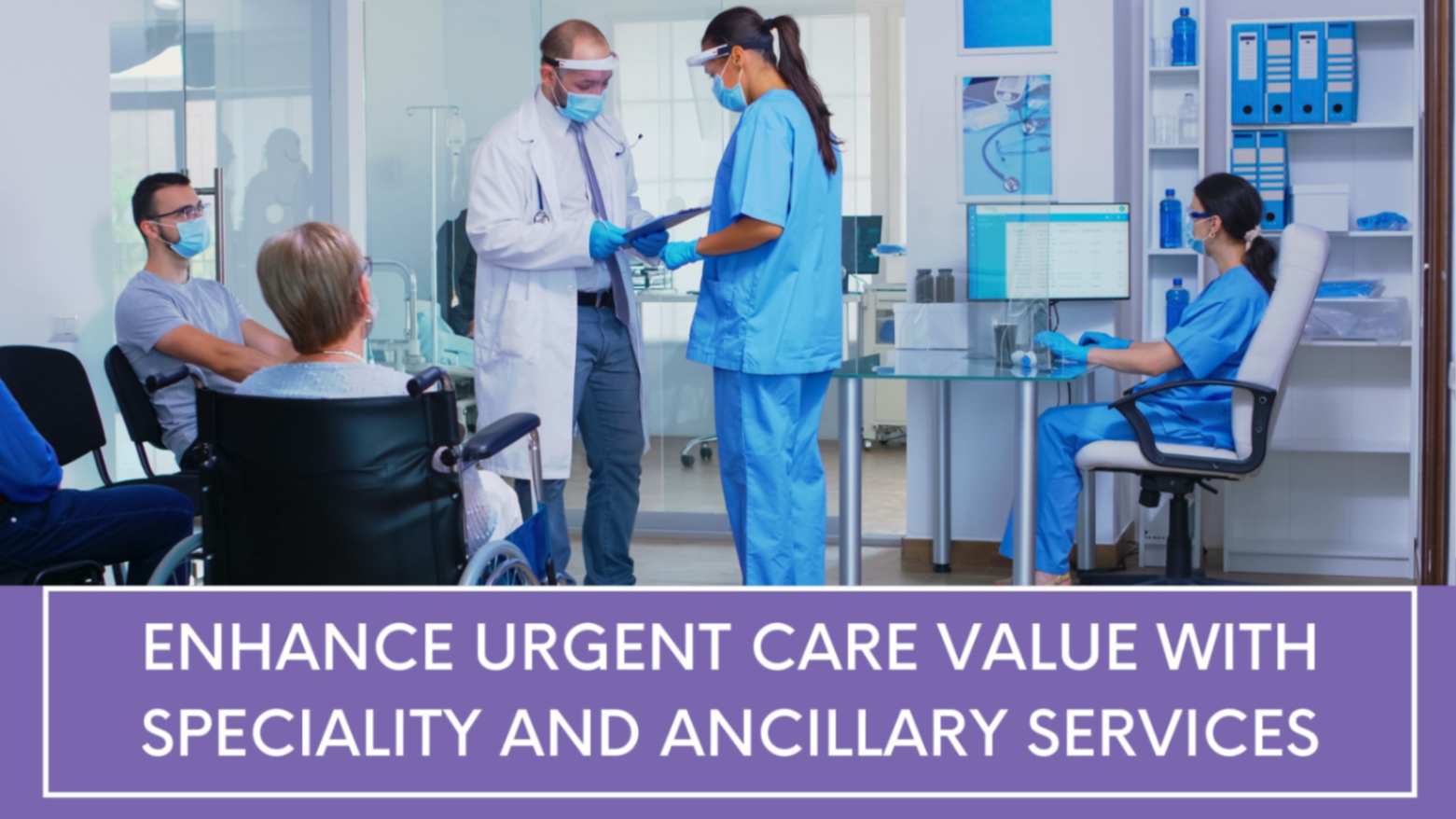Enhance Urgent Care Value with Specialty and Ancillary Services
Before setting out to splurge on Urgent Care facility, providers have a lot of things to keep in mind. These are services that can potentially increase the value of the Urgent Care clinics.
Ancillary Service is the keyword.
There are also several other aspects to consider including insurance, location in the given community, certifications, cost of business, and more, but ancillary services help in offering a variety of services that effectively support patients to a great extent.
Focusing on improving daily activities is for starters. Once the urgent care business starts to see effective results, it is always the best idea to implement specialty services that not only increase revenue for the Urgent Care center but also the patient flow. In addition to the benefits, there is always the ultimate catharsis for providers after delivering fulfilled services to the patients.
There are a few reasons you may want to supplement your urgent care business with primary care, occupational medicine, or other ancillary service lines.
Table of Contents
Community demands:
Even though the bottom line of urgent care services remains intact, there will be a strong push from the community that Urgent Care is serving, demanding other kinds of services, so it is indisputable to encourage such demands and deliver the solution through the required services. This will ultimately add value to the patient service and the community while also building a strong Urgent Care business.
Seasonal changes in business:
These are fluctuations in the business that occurs seasonally. In the Urgent Care industry, these are very common. For instance, there is always a higher volume of patient influx during winter days as the cold and flu sets in, when compared to the influx during the rest of the months.
A wider base of patients:
For introducing newer prospects to the patients, Urgent Care businesses will always be a step ahead. It is always imperative that the providers ensure delivering exceptional ancillary services to the patients, so they consider coming back to the facility when they are looking out for on-demand patient care. With more patients comes increased revenue.
Know it before you go for it!
It is always important to have a clear picture before starting out with anything. Urgent Care physicians must do their homework first before setting out to bring about ancillary services to their practices. One must ensure that they possess the complete capability to deliver additional services to accommodate the patients who visit the Urgent Care facility for on-demand services.
Once providers introspect their abilities to deliver the services, they may go ahead with researching potential specialties that they can focus on that could also fulfill the community requirements.
Here are a few specialty service lines under ancillary services that the Urgent Care providers can incorporate into their practice to generate additional revenue streams while satisfying patients’ comforts.
Occupational Medicine
Occupational Medicine or OccMed refers to the services provided by healthcare centers to employees of companies and government offices. It often consists of employer-paid treatments and workers’ compensation injury management. Urgent Care facilities could already be constituting OccMed services for worker’s compensation, but it is imperative for them to slowly bring about other services under occupational medicine. These services typically include blood/urine/drug tests, flu shot services, physical examinations, on-site lab tests, and such.
Having said that, just bringing in the OccMed services is not just enough. It is also important to determine if the given services satisfy the community. For instance, if the Urgent Care facility is situated in a more white-collared locality, then it is always best to offer wellness programs. For industry-rich areas, screening tests and worker’s compensation will be the best choice.
Urgent Care services should be picky when it comes to the services that they originally decide to offer. They must strategically market the services, concentrating on their advantages.
Telehealth services
Urgent Care centers are known for their hallmark attitude toward entrepreneurship. They are constantly flowing through new spaces and ways to build advanced methods to deliver patient care. Telemedicine is one such advancement that Urgent Care centers are radically incorporating. Although telemedicine is not the latest news, it came to the light during the post-pandemic era. It has now become more convenient for many providers and patients and is more readily accessible to the general public at this point.
Due to the fact that they often have similar objectives, urgent care and telemedicine may coexist happily in most situations. They both are focused on increasing the efficiency of patient care, increasing revenue, saving patients’ time, and delivering the best possible quality of patient care to the ones on demand.
Let us see some advantages of bringing in telemedicine with Urgent Care:
- Greater accessibility to care
- Increased effectiveness
- Improved medical results
- Improved patient comfort
- Higher cost savings
Not just these, telemedicine does not require much effort to implement as well. It requires a good network, secured video conferencing solutions, and the availability of professionals at all points. The success of your telemedicine practice and patient contentment can both be ensured with telemedicine-specific training that focuses on best practices in this particular area of healthcare.
Primary Care
As timely access to primary care physicians is becoming more and more difficult to come by in many regions, several urgent care facilities are thinking about including primary care services in their menu of services. Patients of urgent care providers are more likely to return for routine medical requirements that can typically be handled by their primary care provider, but as they develop relationships with Urgent Care staff, they are more likely to reconsider. Rural places are where this is especially true.
Primary healthcare services include the prevention of diseases, promoting good health, treating chronic ailments, and patient diagnosis.
Clubbing primary care and urgent care are becoming widely common and is termed Hybrid Clinics that offer practice workflows, patient documentation, and data to bring about long-term health care plans. For urgent care clinics that provide primary care services, selecting a system that supports workflow for all types of treatment is crucial to success.
Children’s Care
Pediatric Urgent care is yet another ancillary service that could come in really handy in the case of residential areas. This will deliver value to the families who are a part of the community. Specializing in pediatric healthcare within urgent care would help yield great revenue, especially in the case of communities that are affluent. In contrast to therapy from a midlevel practitioner, parents prefer high-level, specialized care for their children and therefore, pediatric ancillary services can only deliver high income.
Parents are very picky when it comes to their kid’s health. They want the best for their children where they can have access to immediate medical care for their child as soon as they walk into the urgent care clinic rather than having to wait in queues for appointments and schedules. Pediatric urgent cares provide parents with what they want and address huge healthcare market needs through flexible work hours, walk-in encounters, and such.
An excellent method to guarantee the success of your pediatric urgent care is to establish positive working relationships with neighborhood physicians and to advise patients to follow up with their regular doctors. If you can win their trust, they might recommend patients to you.
Orthopedic Care
The expanding need for orthopedic-specific urgent care is due to the fact that it can frequently take a long time than most patients would choose to wait to see an orthopedic surgeon outside of an emergency.
It is always the best choice for Urgent Care facilities to offer patient care for ortho. Rather than sending or referring the patients to a specialist, Urgent Care centers can fill in the void and directly deliver what the patient requires. This will cut costs and improve patient convenience while also making sure that the outcomes can radically deliver timely treatment when urgent.
Orthopedic Urgent Care can think about offering wellness exams to athletes in order to capture a portion of sports medicine encounters. Another offering that orthopedic urgent care could deliver is ortho-intervention, which is not so common but could make a difference at smaller levels.
In response to the growing demand, many orthopedic urgent care centers are now providing baseline concussion assessments and treatments for kids playing higher-intensity sports such as soccer and football. They can also conduct baseline testing that involves examining the athlete’s brain function, memory skills, concentration levels, problem-solving ability, etc.
Baseline testing is a pre-season exam used to assess an athlete’s balance and brain function (including learning and memory skills, ability to pay attention or concentrate, and how quickly he or she thinks and solves problems), as well as if there are any signs of a concussion. If an athlete has a probable concussion, baseline test results can be used and evaluated with the comparable test during the game season.
Other Choices
Maybe the Urgent Care facility might not be completely in for all the ancillary services, but that does not possibly mean that there are no other options out there. Let us look into a few more options that Urgent Care services have in order to expand their business values and revenue.
Nutrition: Provide services and guidance to persons who need to follow a restricted diet or who desire to stay healthy by eating better or dieting.
Physical Therapy: Consistently offer services for pain management and physical therapy. Selling substantial medical devices is one possibility.
Medicine Dispensing: To provide patients with more convenience and flexibility, dispense medications in the Urgent Care practice.
Weight Control: Provide a weight-control strategy to patients to assist them to become healthier and fit. Vitamins and food products may be included.
Baselines and Testing for Concussions: Demand for these tests is increasing as awareness of the potential long-term effects of brain injuries in sports grows, and they could provide an additional source of income for urgent care facilities.
Travel Healthcare: Delivering travel health services, such as a location risk assessment, physical examination, and necessary vaccinations, in light of the increased number of international visitors. Think about packing a compact, stylish travel package that contains preventative medications, first aid kits, and helpful travel advice.
Wellness Healthcare: Concentrate on annual checkups, immunizations, and lifestyle changes to enhance general health.
Long-Lasting Medical Products: Enhance value by keeping medical supplies close, rather than transporting patients elsewhere. Urgent Care centers can offer professional advice or utilize and maintain the relevant tools after obtaining a diagnosis.
Bottom Line
The choices are endless for Urgent Care facilities and it is continuously evolving. With new requirements come newer ideas and opportunities to exhibit. However, it is important for urgent care facilities to keep their community and their needs in mind always so that the changes that they bring in could have a radical impact on the urgent care revenue.
Practolytics offers Urgent Care Billing services that come in handy for all your urgent care needs, specialty, and ancillary billings. Our experts are focused on quality, so that you can focus on your patient‑care efficiency. For more information, reach out to us!
ALSO READ – How to Improve the Staffing Efficiency in Urgent Care Services?
Talk to Medical Billing Expert Today — Get a Free Demo Now!






